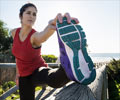This weekend a hardy group of ultramarathon runners aim to run the length of the 160 kilometre-long (100miles) Berlin Wall.

It is the equivalent of running four marathons in succession.
The race winner is expected to take 16 hours, but most entrants will run through the night and the cut-off point is set for 12pm on Sunday, 30 hours after the start.
Berlin's ultramarathon is held on the weekend nearest August 13, the date in 1961 when the Berlin Wall was raised by the former East German government eager to stop their citizens fleeing to the west.
Until restrictions on border crossings were lifted by the communist regime on November 9, 1989, it was a symbol of oppression for the city's citizens on either side and the race is closely linked to the wall's history.
Finishers of the inaugural race in 2011 were given a medal engraved with the face of Chris Gueffroy, the last person shot dead by East German border guards trying to cross the wall on February 5, 1989, and his mother Karin was a guest of honour.
Advertisement
"We wanted to organise a 100-mile race partly to commemorate those who lost their lives on the wall and every year we remember a specific victim who was killed trying to cross," organiser Dr Ronald Musil told AFP.
Advertisement
Compared to your typical Sunday jogger, Vanicek's average speed of 6:06 minutes for each kilometre is as impressive as the idea of running four marathons back-to-back.
This year there are 245 competitors, the youngest being 25 while the oldest is 72 and entrants will either tackle the entire distance solo or as part of a relay.
However, most have either some experience of long-distance running or at least a realistic idea of what to expect.
"It's not unusual for people to underestimate a marathon, but that's not something we tend to find," said Dr Musil.
"People tend to know what they are letting themselves in for in an ultra marathon."
"The only thing we ask is that participants have a medical check with a doctor, carry a mobile phone plus water and wear a reflective vest when running at night, with a head-torch to see the way."
This year's field includes past winners of both the Spartathlon, the 246-kilometre Greek race held annually between Athens and Sparta, and the notorious Badwater Ultramarathon, the self-styled "world's toughest foot race" over 217 kilometres through California's Death Valley in the USA.
The logistics of the Berlin race include 300 volunteer helpers manning 27 first-aid stations along the route, each kitted out with 470kgs of food and drink to restore weary legs.
"It's a logistical challenge to supply each station, many of which stay open through the night," said Dr Musil.
"It is actually harder in the city centre than in the remote areas, as there is more traffic to contend with and more regulations."
On race day, breakfast is offered at the start from 4am and the route is marked by fluorescent blue arrows to help runners, especially through the night.
Runners are registered from all over the world including Australia, New Zealand and the USA.
At 189 euros (US$251), entry is not cheap, but the event is run by a group of dedicated volunteers as a non-profit making venture.
Entry for the 2014 race has already opened and the limit has been raised from 250 to 500.
Source-AFP











